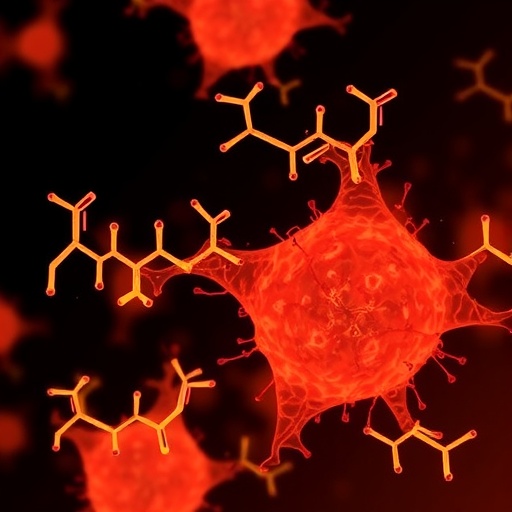In a ground-breaking study published in Molecular Diversity, researchers have embarked on an ambitious quest to identify novel β-lactamase inhibitors against the formidable pathogen Klebsiella pneumoniae. This bacterium is known for its ability to develop resistance against a wide array of β-lactam antibiotics, which poses a significant threat to public health. With the rise of antibiotic-resistant infections, the exploration of new therapeutic agents has become increasingly critical. The study conducted by Sundaresan et al. leverages an innovative fragment-based drug discovery approach, which could pave the way for the development of effective treatments against resistant strains of Klebsiella.
At the heart of this investigation lies the historical context of β-lactam antibiotics, the cornerstone of modern antibacterial therapy. Over the past few decades, the rise of β-lactamase enzymes—molecular weapons deployed by bacteria to inactivate these antibiotics—has rendered many of these once-powerful drugs ineffective. The emergence of Klebsiella pneumoniae as a major actor in this bacterial resistance narrative highlights the urgency of finding new inhibitors that can restore the efficacy of β-lactam antibiotics.
The researchers employed a fragment-based approach to drug discovery, an innovative strategy that involves screening small chemical fragments that can bind to a biological target. By generating a library of these fragments and assessing their ability to inhibit β-lactamase enzymes, the team aimed to identify lead compounds that could be further developed into potent inhibitors. This method not only accelerates the identification of potential therapeutic agents but also enhances the likelihood of discovering unique chemical scaffolds that traditional high-throughput screening might miss.
The study meticulously outlines the screening process, beginning with the selection of a diverse library of fragments that varied in size and functionality. The researchers utilized advanced computational modeling alongside in vitro assays to evaluate the binding affinity of these fragments to the β-lactamase enzyme from Klebsiella pneumoniae. The combination of computational and experimental techniques allowed the team to rapidly assess a large number of candidates in a relatively short timeframe, ensuring efficiency in their quest for novel inhibitors.
Following the initial screening, the researchers engaged in hit validation, where they focused on a subset of fragments that demonstrated promising inhibitory activity. This crucial phase involved determining the selectivity and potency of the identified compounds while analyzing their potential effects on the bacterial metabolism. The hits that emerged from this rigorous validation process were further optimized through medicinal chemistry approaches to enhance their efficacy and minimize toxicity. The iterative nature of this methodology exemplifies the importance of collaboration between chemistry and biology in drug discovery.
Throughout their research, Sundaresan et al. maintained an open line of communication regarding the limitations posed by current β-lactamase inhibitors. Many existing compounds have not been designed to effectively combat the specific β-lactamases produced by Klebsiella pneumoniae. As a result, the discovery of new and selective inhibitors is paramount to overcoming the challenges posed by these resistant strains. The study sheds light on the critical implications of their findings, emphasizing the need for continuous innovation in antibiotic development.
The ramifications of this research extend beyond laboratory walls, touching upon the broader public health landscape. The World Health Organization has classified antibiotic resistance as one of the top ten global public health threats, thus reinforcing the urgency for effective treatment options. By uncovering new β-lactamase inhibitors, the research holds promise for improving patient outcomes and combatting the growing epidemic of antibiotic-resistant infections.
Moreover, the collaborative aspect of this research cannot be overlooked. The integration of diverse expertise—ranging from molecular biology to computational chemistry—underscores the importance of interdisciplinary approaches in tackling complex health challenges. Such collaborations are increasingly vital in the fight against infectious diseases, particularly in an era where the pipeline for new antibiotics has significantly dwindled.
In conclusion, Sundaresan et al.’s exploration of novel β-lactamase inhibitors represents a significant advancement in the field of drug discovery. Their innovative approach not only highlights the potential of fragment-based strategies but also sets a precedent for future research aimed at overcoming antibiotic resistance. As the scientific community rallies to address the growing threat of resistant pathogens, studies like this offer a beacon of hope, driving efforts towards developing effective treatments for conditions that once seemed insurmountable.
This pivotal research encourages further investigation into the chemistry of β-lactamase inhibitors and calls upon pharmaceutical companies, academic institutions, and public health organizations to prioritize similar initiatives. With the cooperation of multiple disciplines and a commitment to novel methodologies, the fight against antibiotic resistance can be revitalized, ultimately leading to healthier populations worldwide.
By pushing the boundaries of our understanding of β-lactamase enzyme inhibition, the study not only contributes to the academic corpus but also challenges the status quo in antibiotic development. The findings are not merely academic; they serve as a reminder of the urgent need for renewed focus and commitment to addressing antibiotic resistance through innovative research strategies.
As the world stands at a crossroads regarding antibiotic usage and resistance management, researchers like Sundaresan, Sureshan, and Jothi are essential in guiding the future landscape of infectious disease treatment. The discoveries made in this study may herald a new era of antibiotics that can withstand the challenges posed by evolving bacterial pathogens, making this work not just significant, but necessary in our ongoing battle against infections.
In sum, this seminal study highlights the remarkable potential housed within the fragment-based drug discovery approach and exemplifies how targeted research can lead to groundbreaking therapeutic innovations. As scientists continue to unravel the complexities of microbial resistance, it is research like this that offers a glimmer of hope for future breakthroughs.
Subject of Research: Exploration of novel β-lactamase inhibitors against Klebsiella pneumoniae.
Article Title: Exploration of novel β-lactamase inhibitors against Klebsiella pneumoniae using fragment-based drug discovery approach.
Article References: Sundaresan, A.K., Sureshan, M., Jothi, A. et al. Exploration of novel β-lactamase inhibitors against Klebsiella pneumoniae using fragment-based drug discovery approach. Mol Divers (2025). https://doi.org/10.1007/s11030-025-11396-z
Image Credits: AI Generated
DOI: https://doi.org/10.1007/s11030-025-11396-z
Keywords: β-lactamase inhibitors, Klebsiella pneumoniae, fragment-based drug discovery, antibiotic resistance, drug development, public health, interdisciplinary research, medicinal chemistry.




